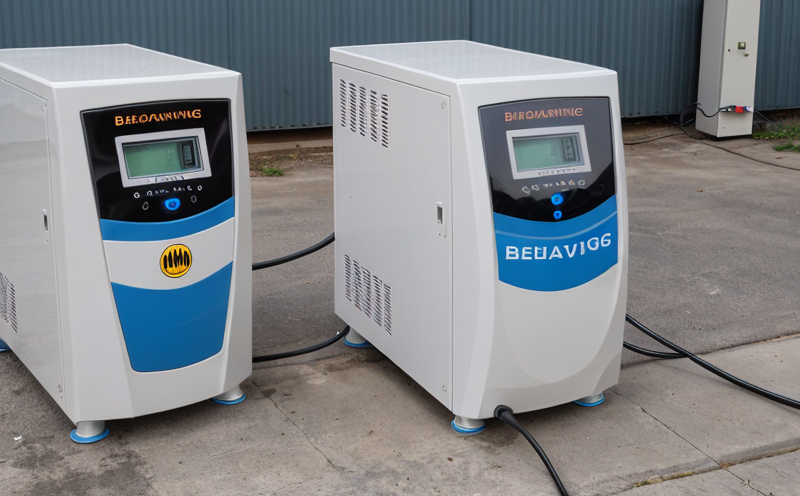BS EN 61960 Charging and Discharging Testing of Secondary Lithium Cells
The BS EN 61960 standard provides a comprehensive framework for the testing of secondary lithium cells, particularly focusing on their charging and discharging behavior. This standard is crucial in ensuring that battery cells used in various applications meet stringent safety, performance, and reliability requirements.
BS EN 61960 covers several key aspects of the charging and discharging process, including:
- Charging: The method for safely and efficiently charging lithium cells to their full capacity. This involves monitoring voltage, current, and temperature during the charging process.
- Discharging: The controlled release of electrical energy from the cell under various conditions, including constant current/constant voltage (CC/CV) methods and step-wise discharge tests.
- Safety Considerations: Ensuring that cells do not overheat or undergo thermal runaway during testing. This includes monitoring for internal temperature rise, external heat generation, and pressure build-up.
- Performance Metrics: Measuring key performance indicators such as energy efficiency, capacity retention, and cycle life under specified operating conditions.
The BS EN 61960 standard is designed to be applicable across a wide range of secondary lithium cells used in portable electronics, electric vehicles, and renewable energy systems. This ensures that the testing methods are robust enough to cover various cell chemistries and form factors.
For quality managers, compliance officers, R&D engineers, and procurement teams, this standard is essential for ensuring that battery cells meet international safety standards. By adhering to BS EN 61960, manufacturers can demonstrate their commitment to producing reliable and safe batteries.
The testing process under BS EN 61960 typically involves the following steps:
- Preparation of Test Specimens: Lithium cells are selected based on their nominal capacity and chemistry. They undergo initial conditioning to ensure consistency across specimens.
- Charging Process: Cells are charged in a controlled environment, with continuous monitoring of parameters such as voltage, current, temperature, and internal resistance.
- Discharging Process: After charging, cells are discharged using various protocols, including constant current/constant voltage methods. The discharge process is closely monitored to ensure safety and performance metrics are met.
- Data Collection and Analysis: All data collected during the testing process is analyzed for compliance with BS EN 61960 requirements. This includes evaluating energy efficiency, cycle life, and other key performance indicators.
The standard also provides guidelines on the use of appropriate equipment, such as charging-discharging testers, environmental chambers, and data acquisition systems. These instruments are essential for accurately measuring the parameters required by BS EN 61960.
By adhering to this standard, manufacturers can ensure that their batteries meet international safety standards and perform reliably under various conditions. This is crucial in industries where battery performance directly impacts product reliability and user safety.
Eurolab Advantages
Eurolab offers a range of advantages for clients seeking BS EN 61960 charging and discharging testing services:
- Expertise in Standard Compliance: Our team is highly experienced in interpreting and applying the requirements of BS EN 61960. We ensure that all tests are conducted in strict adherence to international standards.
- Advanced Testing Equipment: Eurolab possesses state-of-the-art equipment, including precision charging-discharging testers, environmental chambers, and data acquisition systems. This ensures accurate and reliable testing results.
- Comprehensive Reporting: We provide detailed reports that not only list the test results but also offer insights into performance trends and areas for improvement. These reports are invaluable for quality managers and R&D teams looking to optimize battery designs.
- Customized Solutions: Eurolab understands that no two clients or batteries are alike. We offer customized testing programs tailored to meet specific client requirements, ensuring the most accurate and relevant data.
- International Acceptance: Our services are recognized by regulatory bodies worldwide, ensuring that your products can be marketed globally with confidence.
With Eurolab, you gain access to a team of experts who understand the nuances of BS EN 61960 and its application in real-world scenarios. Whether you're an established manufacturer or a startup entering the market, our services are designed to meet your needs effectively and efficiently.
International Acceptance and Recognition
The BS EN 61960 standard is internationally recognized for its stringent requirements on charging and discharging behavior of secondary lithium cells. This ensures that batteries meet the highest international standards, which is crucial for global market entry.
- European Union: As a European standard, it is widely accepted within the EU and is often required by regulatory bodies in member states.
- Australia/New Zealand: The standard is recognized by regulatory authorities in Australia and New Zealand, ensuring compatibility with local market requirements.
- United States: While not mandatory, compliance with BS EN 61960 can be a strong selling point for international customers, enhancing the credibility of your products.
- Asia-Pacific Region: Many countries in the Asia-Pacific region recognize and require adherence to international standards like BS EN 61960, ensuring that batteries meet regional safety and performance requirements.
The widespread acceptance of BS EN 61960 ensures that your products can be marketed globally with confidence. By adhering to this standard, you ensure that your batteries are safe, reliable, and perform consistently under various conditions.
Competitive Advantage and Market Impact
Compliance with BS EN 61960 provides several competitive advantages:
- Innovation Leadership: By staying ahead of international standards, you demonstrate your commitment to innovation and excellence.
- Market Access: Adhering to global standards ensures that your products can be sold in multiple markets without the need for additional certifications or modifications.
- Credibility: Customers trust brands that meet stringent international standards, which enhances brand credibility and reputation.
- Safety Assurance: Compliance with BS EN 61960 ensures that your products are safe, reducing the risk of recalls and product liability issues.
- Cost Efficiency: By ensuring compliance early in the development process, you avoid costly rework or modifications later on.
In today’s competitive market, meeting international standards like BS EN 61960 is not just a requirement; it's a strategic advantage. It enhances your brand’s reputation and ensures that your products are safe, reliable, and perform consistently under various conditions.





